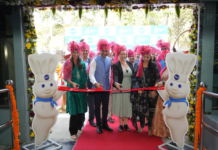Global sustainable food packaging leader Huhtamaki and international charity WasteAid have announced a EUR 900,000 partnership to drive community-level circular economy innovation in Vietnam, India, and South Africa for two years. To mark its 100th anniversary, Huhtamaki is donating EUR 3 million to global sustainability initiatives with a local impact. Acting today, educating for tomorrow, and funding innovation for the future, making a difference where it matters most address global sustainability challenges and build circular economy initiatives.
Circular economy initiatives
According to the press statement, the Huhtamaki funded project will provide financial support to WasteAid to deliver education and training on waste management and circular systems. It will enable WasteAid to work with key stakeholders in Johannesburg (South Africa), Ho Chi Minh City (Vietnam) and Guwahati (Assam, India) to fast-track and amplify local solutions that create value and reduce waste and pollution, in line with the UN’s Sustainable Development Goals.
Ceris Turner-Bailes, WasteAid chief executive, said, “The shift towards a circular economy offers vast potential for global development and WasteAid is proud to be at the forefront of that change. This major partnership between WasteAid and Huhtamaki offers the opportunity for greater impact and is a huge milestone in the development of WasteAid as an organization. We’re delighted to be working with the Huhtamaki team and look forward to delivering this groundbreaking initiative over the coming two years.”
President and chief executive officer of Huhtamaki Charles Héaulmé said, “We want to make a difference, where it matters most. We want to support local communities concretely by providing education and training on waste management and circular systems. Delivering on our ambitious sustainability agenda requires collaboration across the value chain. We chose to partner with WasteAid as it is already making a positive impact on plastic pollution. An illustration of this is their project in West Africa, where trainees are turning plastic waste into useful products like paving tiles. Very quickly, the local team prevented a million plastic bags from being burned or reaching the ocean. A year after, 55 families continue to collect, sort and process plastic waste, reducing pollution and carbon emissions and protecting the health of their community in Gunjur, Gambia. We will be learning from our partnership with WasteAid and will share our insights with global stakeholders as part of our sustainability journey to deliver on our 2030 strategy.”
The project – WasteAid will bring its expertise in sustainable waste management to share skills, develop business ideas and create end-markets for recyclable materials, driving innovation and developing a new generation of green entrepreneurs locally. The two-year program will be focused on educating diverse local communities via a cloud-based learning platform, networking events, training programs and will seek to inspire innovative sustainable solutions through local innovation competitions.
The program will accelerate knowledge transfer and cultivate great ideas within communities most affected by poor waste management. Developing alternatives to dumping and burning of waste makes homes more liveable, reduces health problems and builds stronger local economies.
Ray Georgeson, Interim Executive Support at WasteAid, will continue to manage the partnership until a dedicated project director is appointed.
IndiFoodBev — authentic, impactful and influential
An English-language food and beverage processing and packaging industry B2B platform in print and web, IndiFoodBev is in its third year of publication. It is said that the Indian food and beverage industries represent approximately US$ 900 billion in revenues which implies more than 20% of the country’s GDP. Eliminating the wastage on the farmside can help to deliver more protein to a higher number of the population apart from generating sizable exports. The savings in soil, seeds, water, fertilizer, energy and ultimately food and nutrition could be the most immense contribution that country is poised to make to the moderation of climate change.
To improve your marketing and grow sales to the food and beverage processing and packaging industry, talk to us. Our research and consulting company IppStar [www.ippstar.org] can assess your potential and addressable markets in light of the competition. We can discuss marketing, communication, and sales strategies for market entry and growth.
Suppliers and service providers with a strategy and budget for targeted marketing can discuss using our hybrid print, web, video, and social media channels to create brand recognition linked to market relevance. Our technical writers are ready to meet you and your customers for content.
The second largest producer of fruit and vegetables in the world is continuously expanding processing capacities and delivery systems with appropriate innovative technologies. We cover product and consumer trends, nutrition, processing, research, equipment and packaging from farm to thali. Get our 2025 media kit and recalibrate your role in this dynamic market. Enhance your visibility and relevance to existing markets and turn potential customers into conversations. Ask for a sample copy of our bi-monthly in print or our weekly IndiFoodBev eZine each Wednesday.
For editorial info@ippgroup.in — for advertisement ads1@ippgroup.in and for subscriptions subscription@ippgroup.in
Naresh Khanna – 10 February 2025
Subscribe Now











